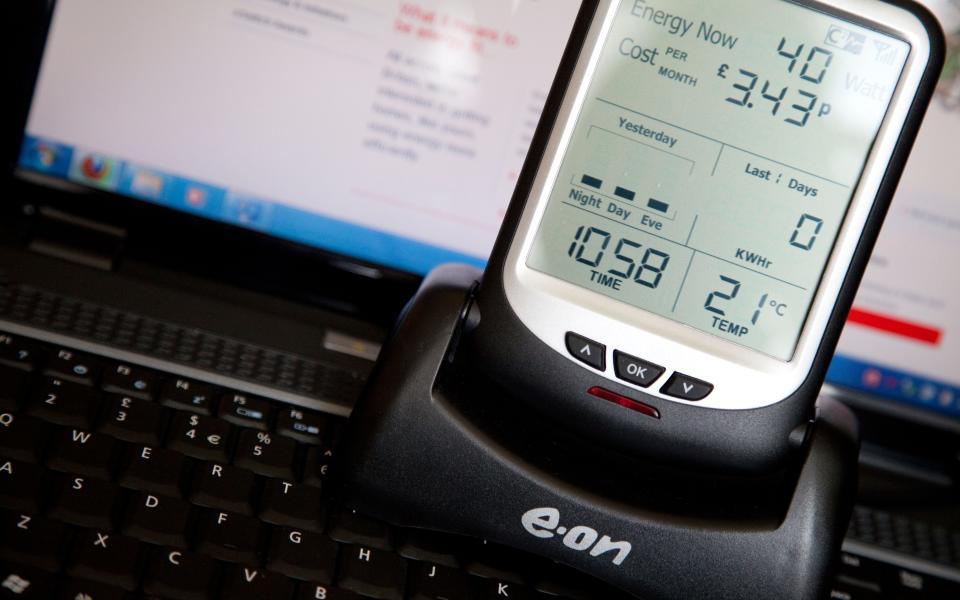Millions of households - even those with 'smart meters' - overcharged £117 for energy they haven't used

More than 11m households could be due an average £117 refund from their energy supplier after being billed for energy they have not used.
For some households - almost one in ten households - the refunds could be more than £200, according to uSwitch, the price comparison and switching service. It estimates a total £1.3bn has been over-charged by suppliers.
The problem of inaccurate billing - where suppliers rely on estimated bills - is not being addressed by the Government's multi-billion pound "smart meter" programme, experts claim.
Smart meters are supposed to ensure ultra-accurate billing because usage is sent by the meter to the supplier automatically at regular, frequent intervals.
But claims that smart meters will "put an end estimated bills" are untrue, said Mark Todd, from energyhelpine, the comparison site.
"Smart meters will put an end to sending out engineers to read your meter, or for consumers to read it themselves. But that's it.
"Just because you've got a smart meter doesn't mean your supplier isn't holding on to thousands of pounds of overpayments."
Smart meters: why they don't spell an 'end to estimated bills'
When smart meters were announced in 2013, the Government claimed they would be "put consumers in control of their energy use" and help save money by monitoring energy spend in real time and sending this data to the supplier. This is supposed to lead to more accurate billing.
Approximately 5.87m households currently have a smart meter installed. The plan is to roll out the devices to all 26m homes by 2020 at a cost of £11bn.
Just because you've got a smart meter doesn't mean your supplier isn't holding on to thousands of pounds of overpayments
Mark Todd, energyhelpline
But a significant number of the almost 6m households with a smart meter are on "spread payment" schemes where annual usage is estimated and then divided into 12 equal instalments.
Monthly payments are thus not adjusted according to the data submitted by the meters on a weekly, daily or even monthly basis. Instead, customers will pay an average monthly fee resulting in over or under payments.
Mr Todd said: "There's billions of pounds being spent on this scheme and so far I think the claims are highly exaggerated.
"Households could still be overcharged, especially where they've set up a direct debit. We've yet to see much evidence of the apparent benefits. The Government has a lot of questions to answer."
Claire Maugham, director of policy and communications at Smart Energy GB, has previously acknowledged to The Telegraph that where customers spread their payments they will not be billed for exact usage in any period. But she said the smart meters meant "a regular monthly payment can be set at a level that accurately reflects your energy use through the year."
Other smart meter glitches
Telegraph Money has heard from numerous readers having issues with their smart meters.
Jane Roberts had a smart meter installed in her Sussex home by supplier Ovo in early 2015.
She was told the figures she questioned on her annual statement were just estimates - not accurate readings, as she assumed. She was not the first Ovo customer with a smart meter who was bemused to receive statements and emails asking her to submit manual meter readings and referring to "estimated readings".
Ovo, one of the suppliers which has been at the forefront of rolling out the equipment, has since admitted that its literature wrongly refers to “estimated” readings even where they are provided by smart meters.
Obviously 1st Gen smart meters aren't fit for purpose. Always disconnecting and now won't connect at all @BritishGasHelp@BritishGaspic.twitter.com/MSbZQBJwU6
— Bluebear (@bluebear2207) April 24, 2017
A wasted morning SSE come to fit smart meters but would not work due to no Vodafone 3g available to transmit data .
— mark dawson (@dogster24) April 22, 2017
Other customers have found that because meters use mobile phone networks, they cease to work where network coverage is weak or erratic.
Suzanne Harvey had a smart meter installed by First Utility in 2014 but became concerned when she didn’t receive a bill for more than a year.
After it failed to respond to repeated complaints she switched to Sainsbury’s Energy, which is supplied by British Gas.
“When the engineer came and installed it, he told us the signal was weak where we lived and that it was probably going to be a waste of time anyway – and that proved to be true,” she said.
Smart Energy GB, said a solution is imminent as suppliers will be able to use the “new national infrastructure network”, which went live in November.
The network, which was meant to be ready by 2015, is run by the Data Communications Company (DCC), owned by Capita, and its delay is the main stumbling block to suppliers meeting the 2020 deadline.
Mark Umpleby tweeted SSE with a photo that said he had used £33,183 of gas in one day - 2,765,175 per cent over budget.
Another customer, Usman Hussain, tweeted a picture of his meter saying he would be charged nearly £9,600 for his day's electricity and gas.
SSE apologised and aid it was aware of an issue affecting "a small number" of its smart meters. It said it would investigate as a matter of urgency.
Will smart meters ever save me any money?
According to Government figures, savings will be small in the early years.
By 2020 it expects the average annual savings for a household with both electricity and gas being monitored by smart meters to be just £11 - less than half the estimated £26.
The Government expects this to rise to £47 by 2030.
Have you had a smart meter disaster? Email amelia.murray@telegraph.co.uk
Compare energy deals across the market with the Telegraph Energy Switching Service

 Yahoo Finance
Yahoo Finance 